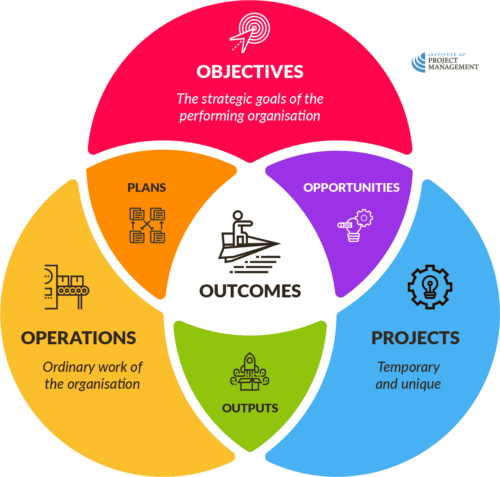1.3: Projects v business-as-usual
Five (5) key differences
If this graphic describes the relationship between operations and projects, how do they differ?

Uncertain performance
We have already established that projects’ temporary and unique nature distinguishes them from the cyclic nature of business as usual – or operations – management.
It is this very uniqueness that makes projects much more uncertain in their performance.
Business as usual, by contrast, is grounded in precedent in that what we do today is pretty much what we did yesterday and the day before.

Significant planning
For this reason, projects demand significant planning beyond the routine planning that goes into an operational effort.
Indeed, two-thirds of this course is devoted to planning, or more properly, everything you need to do before you pick up that hammer.
Admittedly, very few project plans are ever perfectly executed. However, it is generally agreed that the better the plan, the better the project.
In the next couple of modules, we will talk about how much is enough.

Up-front financing
Another big difference between projects and business as usual is how they are financed.
For an organization, operations are generally self-sufficient because they pay for themselves with the revenue they generate.
On the other hand, projects often do not produce a cent of income until they are finished – everything is an expense until that point.
Even projects with a cash flow, such as those delivered under contract, demand strict management of their finances and reserves.

New and complex relationships
Project teams and stakeholders are also often brought together for the first time in the delivery of a project.
Their working and reporting relationships can be unfamiliar, as day-to-day work’s simple, well-understood hierarchies are suddenly disrupted and made complex.

Disruptive change
In fact, ‘disrupt’ is exactly what projects do.
In creating new future states, they disrupt the orthodoxy – an orthodoxy that is used to (and probably prefers) realizing change through the gentler, organic process of continual improvement.

Innovation
Projects are how we innovate.
Innovation is a bit of a buzzword in management these days.
We now recognize that people and enterprises who innovate – in other words, those who successfully identify and deliver change – are the ones who ultimately prosper.
So, as the main way we deliver change, projects are at the cutting edge of individual, organizational, and social development.
Not that this is anything new!
The Great Pyramids of Egypt and the Great Wall of China are successful projects whose outputs have more than stood the test of time.
It is only now, however, that we are starting to treat project management as a distinct leadership science.

